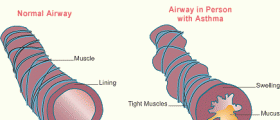
Facts about Asthma
Medical experts claim that asthma is triggered by both genetic and environmental factors. The treatment for this disease usually involves inhaling beta-2 agonist or avoiding the potential triggers of this condition. Every patient responds to treatments differently and, therefore, the treatments themselves may vary.
Today, more than 300 million people are suffering from asthma. In fact, during 2009, more than 250,000 deaths due to asthma took place. Therefore, it is crucial to get the right treatment and start battling this disease early, working your way towards complete healing and a life without asthma.
Finding a Proper Treatment
Usually, asthma attacks are triggered by allergies. During asthma attacks the muscle surrounding the airways gets into a state of spasm, becoming tight, causing the lining of the airways to swell. Subsequently, the sufferer cannot breathe sufficiently, needing medical assistance and a proper treatment.
The symptoms may vary in intensity from one person to another. Thus, some may experience an asthma attack through coughing, while others may end up in a life-threatening situation, due to a severe restriction of their respiratory pathways.
As far as allergies are concerned, these can trigger asthma attacks too.
Once you visit your doctor, he/she will use a stethoscope in order to listen to the activity of your lungs. Even though you might breathe freely between your asthma episodes, this method can be useful for the diagnosis process.
If an asthma patient has blue lips and face, feeling tired and confused, bothered by extreme breathing difficulties and increased pulse, he/she needs to be hospitalized and treated as soon as possible. Additionally, abnormal breathing, cessation of breathing, nasal flaring and tightness in the chest are all signs worthy of your doctor's concern.
Allergens Causing Asthma
Animal hair is one of the most common triggers of asthma symptoms, along with dust or a change of climate. Sometimes, even chemicals from the food one consumes may be sufficient for leading to asthma complications. Pollen is yet another potential cause. Additionally, respiratory infections like the common cold are known to make matters worse for asthma sufferers. Finally, stress and cigarette smoke earn their place on the list of common asthma triggers.
Usually, asthma patients need to undergo allergy tests where the exact allergen or allergens will be pinpointed. Then, the patient can avoid exposure to these substances or circumstances, keeping complications of this condition at bay.






,-Asthma-And-Anxiety_f_280x120.jpg)










Your thoughts on this
Loading...